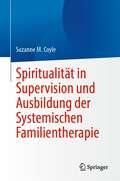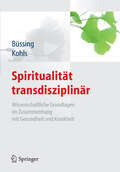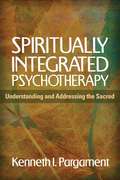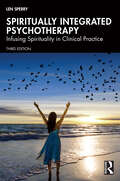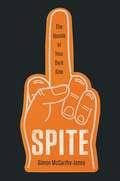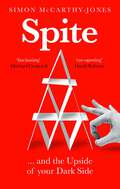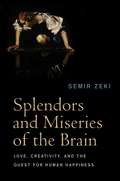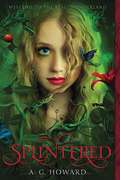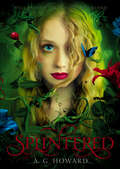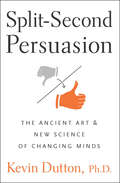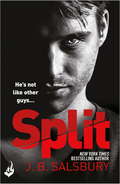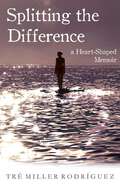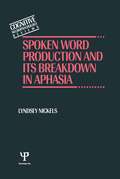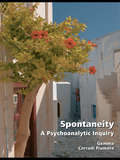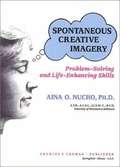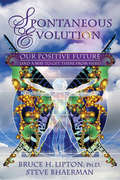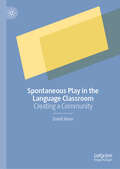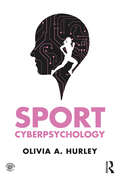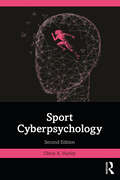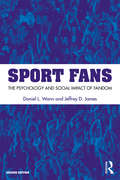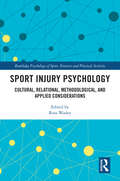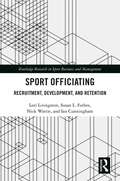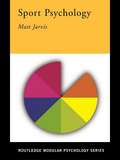- Table View
- List View
Spiritualität in Supervision und Ausbildung der Systemischen Familientherapie
by Suzanne M. CoyleIn diesem Buch werden die Auswirkungen der Erforschung der Spiritualität durch die Linse der menschlichen Beziehungen untersucht. Es befasst sich mit systemischer Supervision und Ausbildung und erforscht einen systemischen Ansatz zur Entwicklung des Selbst. Das Buch bietet eine pädagogische Methodik, die eine Grundlage für die Beschreibung eines operativen Modells der Spiritualität schafft, das sowohl für theistische als auch für nicht-theistische Perspektiven geeignet ist. Darüber hinaus wird detailliert dargelegt, wie Spiritualität selbst eine Vielfalt ist, und Spiritualität wird durch die Linse der Vielfalt erforscht. Darüber hinaus veranschaulicht ein Pilotforschungsprojekt zum Thema Spiritualität in einer MFT-Live-Supervisionsgruppe, wie ein systemischer Ansatz auf Spiritualität angewendet werden kann. Schließlich bietet das Buch Beispiele für die praktische Anwendung von Spiritualität in verschiedenen Ausbildungssituationen.Zu den wichtigsten Themenbereichen gehören:- Wie ein systemischer Ansatz zur Spiritualität die Linse der Beziehung und der Vielfalt ermöglicht, um die Supervision und die Lehre der Familientherapie zu bereichern, die aus dem Selbst der Therapeuten hervorgeht.- Theoretische Perspektiven, die systemische Praxis mit Spiritualität in einem Ansatz für Familientherapie verbinden.- Wie ein systemischer spiritueller Ansatz in der Ausbildung von Ehe- und Familientherapeuten eingesetzt werden kann.- Interventionen, die sich darauf konzentrieren, wie ein relationaler systemischer Ansatz Transzendenz und Immanenz sowohl aus klinischer als auch aus spiritueller Perspektive betrachtet.- Konzepte, die in die Supervision und Ausbildung einfließen, mit dem Ziel, die Studierenden zu spiritueller Kompetenz und spiritueller Sensibilität zu erziehen.- Hindernisse bei der Umsetzung dieses Ansatzes mit Beispielen, wie solche Hindernisse angegangen werden können.Spiritualität in der systemischen Familientherapie-Supervision und -Ausbildung ist ein unverzichtbares Hilfsmittel für Forscher, Professoren, Doktoranden sowie Kliniker, Supervisoren und Fachleute in den Bereichen klinische Psychologie, Familienstudien/Familientherapie und öffentliches Gesundheitswesen sowie in allen damit verbundenen Disziplinen.
Spiritualität transdisziplinär
by Niko Kohls Arndt BüssingIm Kontext der Gesundheitswissenschaften wird vor allem im angloamerikanischen Raum der Zusammenhang von Spiritualität, Religiosität, Achtsamkeit mit Lebensqualität und Gesundheit erforscht. Viele empirische Studien belegen, dass dieser Zusammenhang medizinisch relevant sein kann. Die Bedeutung von Spiritualität wird zunehmend nicht nur innerhalb der Palliativ- und Schmerzmedizin erkannt, sondern auch im Rahmen der Gesundheitspsychologie, Lebensqualitäts- und Versorgungsforschung. An der Schnittstelle von subjektiv empfundener Bedeutsamkeit und empirisch belegbarer Gesundheitsrelevanz ist die Verbindung mit den transdisziplinären Forschungsfragestellungen zu sehen, deren Bearbeitung sich dieses Buch verpflichtet sieht. Geschrieben für Praktiker (Ärzte, Psychologen, Analytiker und Pflegende) sowie für Studierende und Forschende aus den Bereichen der Medizin, Pflegewissenschaft, Psychologie, Soziologie, Theologie, Religionswissenschaft, Philosophie und Kulturanthropologie.
Spiritually Integrated Psychotherapy
by Kenneth PargamentFrom a leading researcher and practitioner, this volume provides an innovative framework for understanding the role of spirituality in people's lives and its relevance to the work done in psychotherapy. It offers fresh, practical ideas for creating a spiritual dialogue with clients, assessing spirituality as a part of their problems and solutions, and helping them draw on spiritual resources in times of stress. Written from a nonsectarian perspective, the book encompasses both traditional and nontraditional forms of spirituality. It is grounded in current findings from psychotherapy research and the psychology of religion, and includes a wealth of evocative case material.
Spiritually Integrated Psychotherapy: Infusing Spirituality in Clinical Practice
by Len SperryAs integrating spiritual concerns becomes commonplace in psychotherapy, this new edition of Spiritually Integrated Psychotherapy leads the way in describing and illustrating its effective clinical practice from the first through to the last session.Effective clinical practice is emphasized with individual chapters on assessment and case conceptualization, intervention, outcome assessment and termination, and cultural and ethical considerations. The text highlights new developments in spirituality, neuroscience, and moral injury, while continuing to provide a concise, theory-based framework for understanding the spiritual dimension. Readers can use this framework as the basis for competently integrating spirituality in effective, evidence-based psychotherapy practice.This practical book is essential for clinicians who wish to incorporate spirituality into their practice, as well as students and trainees preparing to practice spiritually integrated therapies.
Spiritually Sensitive Psychoanalysis: A Contemporary Introduction (Routledge Introductions to Contemporary Psychoanalysis)
by Gideon LevThis book provides an accessible introduction to spiritually sensitive psychoanalysis, an analytic tradition characterized by sensitivity to the spiritual and religious dimensions of human life and oriented towards spiritual growth. Psychoanalysis has historically evinced severe suspicion to all ideas and ideals of religion and spirit. However, in recent years, a new analytic approach is emerging, which recognizes faith and spirituality as crucial parts of full, satisfying psychic life. This book explores the unique ways in which this approach refers to and understands core analytic issues such as transference, interpretation, psychopathology and psychic development. It goes on to expound the approach’s understanding of the analytic relationship and the way it influences the spiritual person. It also discusses the tensions arising between this emerging school of thought and the existing body of psychoanalytic knowledge. Psychoanalysis is a practice that deals with the most profound questions of life and creates shifts in the way reality is perceived. Discussing freely and deeply its spiritual aspects and aspirations will enlighten analysts new to the emerging spiritually sensitive tradition, as well as those who are more familiar with it, and who are looking for a comprehensive description of this fresh approach to analysis.
Spite: The Upside of Your Dark Side
by Simon McCarthy-JonesSpite angers and enrages us, but it also keeps us honest. In this provocative account, a psychologist examines how petty vengeance explains human thriving. Spite seems utterly useless. You don't gain anything by hurting yourself just so you can hurt someone else. So why hasn't evolution weeded out all the spiteful people? <P><P> As psychologist Simon McCarthy-Jones argues, spite seems pointless because we're looking at it wrong. Spite isn't just what we feel when a car cuts us off or when a partner cheats. It's what we feel when we want to punish a bad act simply because it was bad. Spite is our fairness instinct, an innate resistance to exploitation, and it is one of the building blocks of human civilization. <P><P>As McCarthy-Jones explains, some of history's most important developments—the rise of religions, governments, and even moral codes—were actually redirections of spiteful impulses. A provocative, engaging read, Spite shows that if you really want to understand what makes us human, you can't just look at noble ideas like altruism and cooperation. You need to understand our darker impulses as well.
Spite: and the Upside of Your Dark Side
by Simon McCarthy-JonesHave you ever done something stupid, dangerous or self-sabotaging just to get one over someone else? Most of us have. Simon McCarthy-Jones draws on psychology, current affairs, literature and genetics to illuminate – whether we admit it or not – our spiteful side. What is that part of us that secretly wants our friends to fail? Did Americans put Trump in the White House just to stick it to Hillary Clinton? And then there are the legion of stories about toxic behaviour in supermarkets and over the privet hedge, ramping up to incendiary divorces, vicious business practices, backbiting politics and scorched-earth terrorism. There&’s a hopeful message too – the upside of our dark side. Spite can drive us forward, and Simon provides a fresh perspective on the concept by showing the evolutionary benefits of spite as a social leveller, an enabler of defiance, a wellspring of freedom and a vital weapon in our everyday armoury.
Splendors and Miseries of the Brain
by Semir ZekiSplendors and Miseries of the Brain examines the elegant and efficient machinery of the brain, showing that by studying music, art, literature, and love, we can reach important conclusions about how the brain functions.discusses creativity and the search for perfection in the brainexamines the power of the unfinished and why it has such a powerful hold on the imaginationdiscusses Platonic concepts in light of the brainshows that aesthetic theories are best understood in terms of the braindiscusses the inherited concept of unity-in-love using evidence derived from the world literature of loveaddresses the role of the synthetic concept in the brain (the synthesis of many experiences) in relation to art, using examples taken from the work of Michelangelo, Cézanne, Balzac, Dante, and others
Splintered
by A. G. HowardThis stunning debut captures the grotesque madness of a mystical under-land, as well as a girl's pangs of first love and independence. Alyssa Gardner hears the whispers of bugs and flowers--precisely the affliction that landed her mother in a mental hospital years before. This family curse stretches back to her ancestor Alice Liddell, the real-life inspiration for Lewis Carroll's Alice's Adventures in Wonderland. Alyssa might be crazy, but she manages to keep it together. For now. When her mother's mental health takes a turn for the worse, Alyssa learns that what she thought was fiction is based in terrifying reality. The real Wonderland is a place far darker and more twisted than Lewis Carroll ever let on. There, Alyssa must pass a series of tests, including draining an ocean of Alice's tears, waking the slumbering tea party, and subduing a vicious bandersnatch, to fix Alice's mistakes and save her family. She must also decide whom to trust: Jeb, her gorgeous best friend and secret crush, or the sexy but suspicious Morpheus, her guide through Wonderland, who may have dark motives of his own.
Splintered: A Splintered Novel (Splintered Series #Bk. 1)
by A. G. HowardA gifted teenager whose ancestor inspired a literary classic descends into a mystical under-land in this romantic, dark fantasy series debut.Alyssa Gardner hears the whispers of bugs and flowers—precisely the affliction that landed her mother in a mental hospital years before. This family curse stretches back to her ancestor Alice Liddell, the real-life inspiration for Lewis Carroll’s Alice’s Adventures in Wonderland. Alyssa might be crazy, but she manages to keep it together. For now.When her mother’s mental health takes a turn for the worse, Alyssa learns that what she thought was fiction is based in terrifying reality. The real Wonderland is a place far darker and more twisted than Lewis Carroll ever let on. There, Alyssa must pass a series of tests, including draining an ocean of Alice’s tears, waking the slumbering tea party, and subduing a vicious bandersnatch, to fix Alice’s mistakes and save her family. She must also decide whom to trust: Jeb, her gorgeous best friend and secret crush, or the sexy but suspicious Morpheus, her guide through Wonderland, who may have dark motives of his own.“Fans of dark fantasy, as well as of Carroll’s Alice in all her revisionings (especially Tim Burton’s), will find a lot to love in this compelling and imaginative novel.” —Bulletin of the Center for Children’s Books, starred review“Alyssa is one of the most unique protagonists I've come across in a while. Splintered is dark, twisted, entirely riveting, and a truly romantic tale.” —USA Today“Brilliant, because it is ambitious, inventive, and often surprising.” —The Boston Globe“It’s a deft, complex metamorphosis of this children’s fantasy made more enticing by competing romantic interests, a psychedelic setting, and more mad violence than its original.” —Booklist“Howard’s visual imagination is superior; a cavalcade of weirdness dances across the pages. . . . The story’s creepiness is intriguing as horror, and its hypnotic tone and setting, at the intersection of madness and creativity, should sweep readers down the rabbit hole.” —Publishers Weekly
Split-Second Persuasion: The Ancient Art and New Science of Changing Minds
by Kevin DuttonAn &“entertaining&” look at the psychology and neuroscience behind the act of influencing others (Kirkus Reviews). People try to persuade us every day. From the news to the Internet to coworkers and family, everyone and everything wants to influence our thoughts in some way. And in turn, we hope to persuade others. Understanding the dynamics of persuasion can help us to achieve our own goals—and resist being manipulated by those who don&’t necessarily have our best interests at heart. Psychologist Kevin Dutton has identified a powerful strain of immediate, instinctual persuasion, a method of influence that allows people to disarm skepticism, win arguments, and close deals. With a combination of astute methods and in-depth research in the fields of psychology and neuroscience, Dutton&’s fascinating and provocative book: Introduces the natural super-persuaders in our midst: Buddhist monks, magicians, advertisers, con men, hostage negotiators, and even psychopaths.Reveals which hidden pathways in the brain lead us to believe something even when we know it&’s not true.Explains how group dynamics can make us more tolerant or deepen our extremism.Illuminates the five elements of SPICE (simplicity, perceived self-interest, incongruity, confidence, and empathy) for instantly effective persuasion. &“[Split-Second Persuasion] offers some powerful insights into the art and science of getting people to do what you want.&” —New Scientist
Split: A powerful, addictive love story with a twist...
by J.B. SalsburyFrom the New York Times bestselling author of The Fighting Series, comes Split, a dark, deeply emotional story of love against the odds with a suspenseful twist, perfect for fans of Katy Evans, Jamie McGuire and Sophie Jackson.When her career takes a hit, Shyann abruptly finds herself jobless, penniless and packing for her hometown - where memories of her late mother and a reunion with her distant father await. Lucas needs a quiet life, and that's exactly what he's found in Payson, Arizona. He finally feels like he fits...and is starting to keep his mind in check. Having suffered blackouts since he was a child, Lucas knows he's not like other guys. The minute he meets his boss's strong-willed, sexy-as-sin daughter, her probing eyes and personal questions pick away at his barriers. Shyann is everything Lucas wants - and everything he should never have. When the blackouts return, the last thing he wants is to expose how dangerous he can be...When you can't trust yourself, how can you ask anyone else to? Don't miss J. B. Salsbury's powerfully emotional romance, Wrecked, coming soon.
Splitting the Difference: A Heart-Shaped Memoir
by Tré Miller RodriguezAt 18, Tré Miller-Rodríguez gave her newborn daughter up for adoption. At 19, her only sibling was killed in a car crash. At 34, she lost her husband to a sudden heart attack. Then, at 36, her now-teenaged daughter found her on Facebook—and began to reshape the course of Tré&’s life. With sharp, immediate prose, Tré unpacks the experience of being young and widowed in New York City: the &“dumb sh*% people say&”; the &“brave face&” she wears to work and social events; the solace she doesn&’t find in one-night stands; and how her perspective only begins to shift when she spontaneously brings Alberto&’s ashes on a trip and sets into motion the ritual of spreading him in bodies of water around the world. Once she&’s begun, Tré discovers that traveling to her bucket list destinations—places like Savannah, Brazil, and Cuba—is a viable strategy for facing her roughest days, and her loss of her husband becomes a lens through which she begins to view her past and embrace her future. By the end of her journey, Tré has quit her corporate job, explored Alberto&’s homeland of Cuba, and joyfully reunited with her biological daughter in North Carolina. Equal parts inspiring, irreverent, and heart-rending, Splitting the Difference is written with the &“raw-thenticity&” of a woman transformed by heartbreak and inspired by love&’s legacy.
Spoken Word Production and Its Breakdown In Aphasia (Cognitive Neuropsychology Reviews Ser. #No. 1)
by Lyndsey NickelsThis volume combines in-depth reviews of models of spoken word production and cognitive neuropsychological disorders of spoken word production. The first section provides a detailed discussion of the development and structure of current models of language production using data form "normal" subjects. It is these models that form the basis of the study and therefore the text attempts to explain their processing mechanisms and assumptions clearly. The evidence used for the development of these models is described including experimental studies and observation of patterns in naturally occurring speech errors.; The second section focuses on studies of aphasic naming disorders and discusses these disorders in terms of the model described in the first section. The emphasis is on single case studies. These are reviewed in three chapters examining semantic errors and disorders, the range of symptoms attributed to disorders of lexical retriveal and deficits of phonological encoding. The text assumes that the reader has some familiarity with the linguistic and psychological terminology relevant to these areas and therefore is most suited to the graduate student or researcher/lecturer.
Spontaneity: A Psychoanalytic Inquiry
by Gemma Corradi FiumaraPsychoanalytic theory frequently explains psychopathology from the perspective of either inadequate early care or as the result of environmental factors. In this book the author suggests that poor mental health can be a result of our incapacity to respond to internal and external stimuli, and indicates that spontaneity is essential in the development of many aspects of the self. It is not what happens to us, but how we react to events, that forms who we are. Spontaneity presents an original approach to issues of agency, spontaneity and creativity in psychoanalysis by exploring questions including: active internalisation paradox forgiveness responsibility empathy self de-creation. This book will be essential reading for psychoanalysts, psychotherapists, philosophers and psychologists. It will also prove to be engaging for those interested in psychoanalytic theory and theories of subjectivity.
Spontaneous Creative Imagery: Problem-Solving and Life-Enhancing Skills
by Martin L. Rossman Aina O. NuchoImagery allows us to see where we've been, and remember formative patterns of not only distress but creative coping and strengths. Imagery also allows us to look into the future, not as fortune tellers, but as creative beings exploring possible alternatives. It allows us to take our inner bearings and to set our sights on where we want to go. With this landmark book, Dr. Aina Nucho brings this powerful navigational tool clearly to light as the multifaceted health resource it can be.
Spontaneous Evolution: Our Positive Future (and A Way To Get There From Here)
by Bruce H. Lipton Steve BhaermanWe’ve all heard stories of people who’ve experienced seemingly miraculous recoveries from illness, but can the same thing happen for our world? According to pioneering biologist Bruce H. Lipton, it’s not only possible, it’s already occurring. In Spontaneous Evolution, this world-renowned expert in the emerging science of epigenetics reveals how our changing understanding of biology will help us navigate this turbulent period in our planet’s history and how each of us can participate in this global shift. In collaboration with political philosopher Steve Bhaerman, Dr. Lipton invites readers to reconsider the "unquestionable" pillars of biology, including random evolution, survival of the fittest, and the role of DNA; the relationship between mind and matter; how our beliefs about nature and human nature shape our politics, culture, and individual lives; and how each of us can become planetary "stem cells" supporting the health and growth of our world. By questioning the old beliefs that got us to where we are today and keep us stuck in the status quo, we can trigger the spontaneous evolution of our species that will usher in a brighter future.
Spontaneous Play in the Language Classroom: Creating a Community
by David HannThis book investigates the importance of humour and play in the establishment of individual and group identities among adult language learners on an intensive business English course. The enclosed setting allows the emergent nature of community building and identity projection to be traced, foregrounding the important role of humorous play in these vital social processes. The book will be of interest to students and researchers of applied linguistics, second language acquisition and humour studies.
Sport Cyberpsychology
by Olivia A. HurleySport Cyberpsychology is the first book devoted to assessing the influence of technology on human interaction, behaviour and mental health in a sport context, gathering research on the use of technology and the Internet by athletes, coaches and sport science support staff. The book identifies the potential impact of technology on athletes' mental preparation for competition, as well as the role of technology in improving performance. It explores the use of technology by athletes and sport organisations for social interaction, while also considering the 'darker' side of athletes’ Internet use. It covers topics including: the role of GPS, gaming and virtual reality in training and injury recovery the use of social media by athletes and sport organisations the psychology of self-presentation and brand management, as well as issues of online privacy the use of technology by other elite groups, such as military and medical personnel, and non-elite sportspeople cyberbullying and online harassment of athletes online gambling and athletes' mental health in relation to their online activities virtual learning environments and the educational opportunities the online world can offer athletes Accessibly written, with a companion website featuring lecture slides, reading lists, video links and suggested social media accounts, Sport Cyberpsychology offers a complete resource for students and instructors alike. It is important reading for any students of sport psychology, sport coaching or sport media, as well as coaches, athletes and sport science support staff.
Sport Cyberpsychology
by Olivia A. HurleyThe new edition of Sport Cyberpsychology is the only textbook in this field that provides a detailed overview of theories, concepts and research findings specifically related to the discipline of sport cyberpsychology. Post-pandemic, this new edition explores the vast psychological impact technology has on athletes' thoughts, emotions and preparations for their sport, as well as the role technology plays in sport consulting, officiating and social interactions. It covers topics that include performance-enhancing technologies, social media use by athletes and sport personnel (e.g., sport officials) and the role of technology in sport psychology consulting. Problematic behaviours athletes may encounter or engage in within the online world, such as their experiences with cyberbullying and online gambling are also discussed.This second edition includes a review of the latest esports research and activities that are gaining global popularity. The final chapter presents some new research horizons in the field of sport cyberpsychology. The book includes a range of helpful features including case studies, open-ended discussion questions, suggestions for future research studies and extensive reference lists.Accessibly written, this edition of Sport Cyberpsychology offers a one-stop, engaging resource for students and instructors alike. It is important reading for students of sport psychology, cyberpsychology, sport coaching, sport officiating and sport technology, as well as coaches, traditional athletes, esports athletes, sport scientists and performers in areas such as dance, the arts, the military and medicine.
Sport Fans: The Psychology and Social Impact of Fandom
by Daniel L. Wann Jeffrey D. James<p>Sports, and the fans that follow them, are everywhere. Sport Fans: The Psychology and Social Impact of Fandom examines the affective, behavioral, and cognitive reactions of fans to better comprehend how sport impacts individual fans and society as a whole. Using up-to-date research and theory from multiple disciplines including psychology, sociology, marketing, history, and religious studies, this textbook provides a deeper understanding of topics such as: <p> <li>the pervasiveness of sport fandom in society <li>common demographic and personality characteristics of fans <li>how fandom can provide a sense of belonging, of uniqueness, and of meaning in life <li>the process of becoming a sport fan <li>sport fan consumption <li>and the future of sport and the fan experience.</li> <p> <p>The text also provides a detailed investigation of the darker side of sport fandom, including fan aggression, as well as a critical look at the positive value of fandom for individuals and society. <p>Sport Fans expertly combines a rigorous level of empirical research and theory in an engaging, accessible format, making this text the essential resource on sport fan behavior.</p>
Sport Injury Psychology: Cultural, Relational, Methodological, and Applied Considerations (Routledge Psychology of Sport, Exercise and Physical Activity)
by Ross WadeyWritten by a team of international experts and emerging talents from around the world, Sport Injury Psychology: Cultural, Relational, Methodological, and Applied Considerations challenges the status quo of the field of sport injury psychology and opens new and exciting future research trajectories by critically considering: How to evolve from an individual focused and single, scientific discipline into a cultural and relational focused and interdisciplinary discourse How to shift from the dominant positivist foundation towards a more inclusive scholarship with divergent epistemologies, theories, and methodologies How to replace the attempt to establish ‘best practice’ and desire for ‘clean’ findings with the need for continuous innovation and multifaceted applied experiences Each chapter stimulates debate and encourages theoretical, methodological, and/or applied diversification, and closes with future research directions that provide novel and rigorous programs of research that have the potential to advance the field of sport injury psychology into an interdisciplinary discourse that strives for and embraces collaboration between academic disciplines and with practitioners working in the field. Cutting edge, timely, and comprehensive, Sport Injury Psychology: Cultural, Relational, Methodological, and Applied Considerations is essential reading for undergraduate students, postgraduate students, and more established scholars in the fields of sport communication, sports medicine, sport psychology, sports sociology, and other related sport science disciplines.
Sport Officiating: Recruitment, Development, and Retention (Routledge Research in Sport Business and Management)
by Nick Wattie Ian Cunningham Lori Livingston Susan L. ForbesSport officials are tasked with maintaining order and adjudicating sport contests. Given their multifaceted role in enforcing rules, standardizing competitions, and keeping sport safe for all participants, they are a requisite part of the sport workforce. With ongoing reports of annual attrition rates in officiating in excess of 20-35% for various sports around the world, there is more than ample evidence that officiating dropout is a persistent, pervasive, and global challenge underpinned by multiple contributing factors including, but not limited to, the threat of verbal and physical abuse. Moreover, despite worldwide recognition and growing interest in the problem, there has not been a comprehensive resource for sport scientists and practitioners studying or working to reverse the ongoing trend. Sport Officiating: Recruitment, Development, and Retention provides a ‘state of the science’ summary in the emerging area of inquiry limited to sport officiating recruitment, development, and retention, and, provides insight and evidence-based approaches to the development of successful officiating development programs (ODP). This book is a primary reference work using a multifaceted, holistic, and evidence-based approach to integrate key findings from the sport science literature to date in suggesting and providing real-world solutions to the practical issues faced by sport organizers. Sport Officiating: Recruitment, Development, and Retention is a key resource for researchers interested in the development of sport officials and for sport practitioners aiming to implement officiating development programs (ODP) at any level within sport systems.
Sport Psychology (Routledge Modular Psychology)
by Matt JarvisSport Psychology is an introductory account of the major psychological issues in sport today. Major theories and up-to-date research are covered in the areas of personality, attitudes to sport, aggression in sport, anxiety and stress, social influences, motivation, and skill acquisition. A wide variety of sporting examples are used, ranging from football to ballet.
